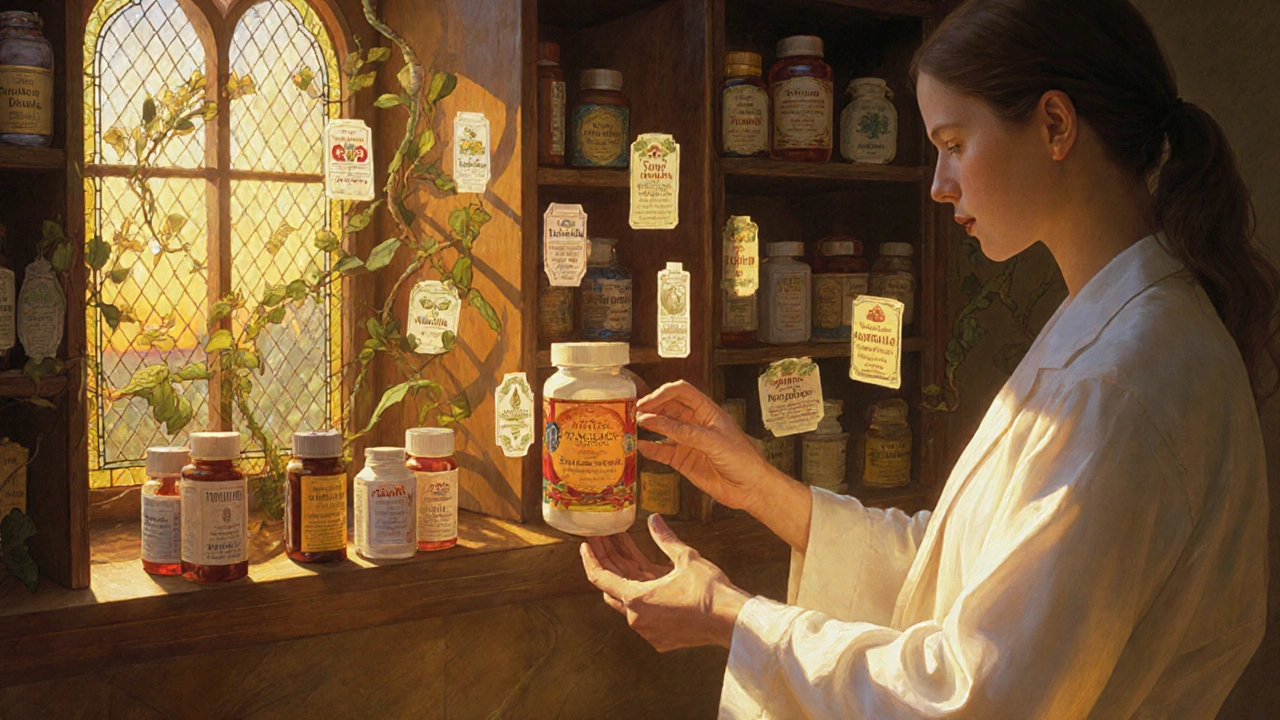Every year, millions of people take supplements and herbal remedies-turmeric for joint pain, garlic pills for heart health, St. John’s wort for low mood. Many believe these are harmless because they’re "natural." But here’s the truth: supplements can be just as powerful-and just as dangerous-as prescription drugs. And if you don’t tell your doctor about them, you’re putting your health at risk.
Most People Don’t Tell Their Doctors
A 2018 study found that only 13% of people disclosed their supplement use to their primary care doctor. Even among those with chronic conditions like diabetes, high blood pressure, or heart disease, less than half shared what they were taking. Why? Because most patients assume their doctor doesn’t care-or won’t understand. Some think, "It’s just a vitamin." Others fear being judged. A 2022 survey showed 68% of supplement users believed their provider didn’t need to know because "it’s natural and safe." But that’s a dangerous myth.What Happens When You Don’t Disclose
Take St. John’s wort, one of the most popular herbal remedies for mood. It doesn’t just lift your spirits-it interferes with how your body processes at least 50 common medications. It can make birth control pills fail. It can reduce the effectiveness of blood thinners like warfarin. It can stop antidepressants from working. In one documented case, a woman taking St. John’s wort for anxiety ended up in the ER after her blood thinner stopped working, leading to a dangerous clot. Another common culprit: garlic supplements. People take them to lower cholesterol. But if you’re on blood thinners or preparing for surgery, garlic can cause excessive bleeding. One Reddit user shared: "My doctor never asked about supplements. I didn’t mention I was taking garlic pills until I had excessive bleeding during minor surgery." Turmeric is another example. It’s anti-inflammatory, yes-but it can also lower blood pressure. If you’re already on medication for hypertension, combining the two can send your blood pressure too low, causing dizziness, fainting, or even falls. These aren’t rare stories. The FDA receives reports of serious side effects from supplements, but experts estimate only about 1% of adverse events are ever reported. That means for every case that shows up in a hospital, dozens more go unnoticed.Why Doctors Don’t Always Ask
It’s not just patients who are at fault. Many doctors don’t ask. A 2021 survey found only 27% of physicians felt adequately trained to talk about supplements. Medical school curricula rarely cover herbal remedies in depth. And with appointments averaging just 15-20 minutes, doctors focus on the most urgent issues: blood pressure, blood sugar, chest pain. But here’s the catch: if your doctor doesn’t ask, it doesn’t mean they don’t need to know. In fact, research shows that when providers ask direct questions-"Are you taking any vitamins, herbs, or supplements?"-disclosure rates jump from 33% to 78%. Simple. Direct. No judgment.
What You Should Say (And How to Say It)
You don’t need to be a scientist to explain what you’re taking. Just bring the bottles. Seriously. Bring the actual containers to your appointment. That way, your doctor can read the label, check the ingredients, and see the dosage. Many supplements contain multiple herbs or hidden active compounds that aren’t obvious from the product name. You can say something like:- "I’ve been taking ashwagandha for stress. I didn’t think it mattered, but I want to make sure it’s safe with my thyroid med."
- "I take fish oil every day for my joints. Is that okay with my blood thinner?"
- "I started using CBD oil for sleep. I know it’s not a prescription, but I wanted to check if it could interact with anything I’m on."
What Your Doctor Can Do
When you disclose, your doctor doesn’t have to be an expert in herbal medicine. They just need to know enough to check for interactions. Many now use digital tools like MyMedList or clinical decision support systems that flag potential herb-drug conflicts in real time. Some hospitals now include supplement use as a standard part of intake forms. Your doctor might:- Adjust your prescription dose
- Suggest a different supplement
- Recommend stopping one temporarily before surgery
- Order a blood test to check for unexpected effects
What the Labels Don’t Tell You
Supplement labels say: "Not evaluated by the FDA." That’s not just fine print-it’s a warning. Unlike prescription drugs, supplements don’t have to prove they’re safe before they hit the shelf. There’s no requirement for clinical trials. No guarantee of purity. No standard for dosage. A 2023 FDA report found that 172 ingredients in supplements have documented safety concerns. Some contain unapproved pharmaceuticals. Others have heavy metals, pesticides, or inconsistent dosing. One brand of turmeric supplement was found to contain 10 times the labeled amount of curcumin. Another had traces of a banned stimulant. The FDA can only remove a supplement after someone gets hurt-and even then, it’s slow. Until then, you’re the first line of defense.
When to Speak Up
Don’t wait for your annual checkup. Tell your provider:- Before starting any new supplement
- Before surgery or a procedure
- When you start or stop a prescription
- If you feel unusual side effects-dizziness, nausea, bleeding, irregular heartbeat
- Even if you’ve been taking it for years

